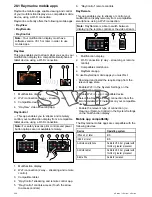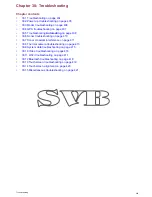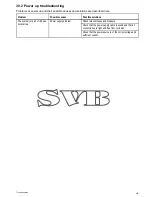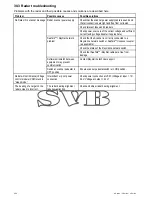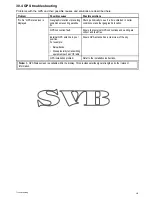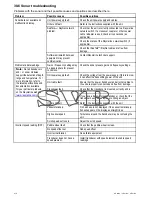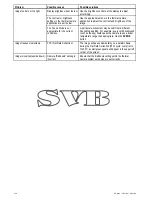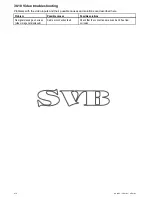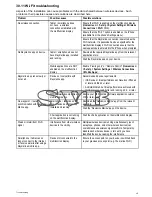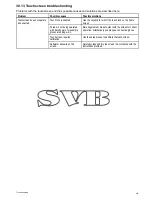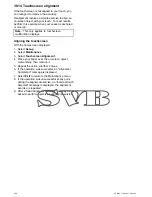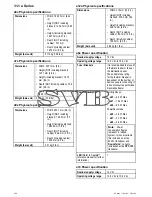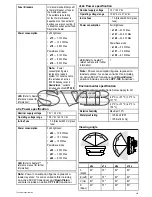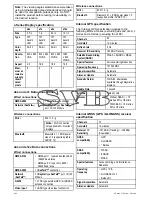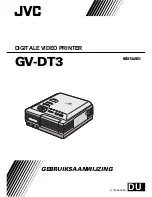
30.7 Sonar crosstalk interference
There are 2 types of potential sonar crosstalk
interference in a Raymarine sonar system:
1.
SideVision
sonar crosstalk interference
2.
Multiple sonar crosstalk interference
The types of crosstalk interference that you
may experience in your system depend on the
combination and type of sonar equipment installed,
and the way in which the equipment has been
installed.
SideVision sonar crosstalk
interference
Multiple sonar crosstalk
interference
Due to the high sensitivity
of
SideVision
transducers,
you may experience some
minor crosstalk interference
between the left and right
receiving channels in areas
of strong target returns.
Examples of strong target
returns include solid objects
such as underwater bridge
structure. This interference
shows up in the Fishfinder
application as subtle
reflections from the right
sonar image displayed in
the left sonar image, or vice
versa.
When using multiple sonar
modules and transducers
operating in overlapping
frequency ranges, you may
experience some crosstalk
interference between the
ranges. This interference is
displayed in the Fishfinder
application as vertical “rain
drops” throughout the water
column. These vertical “rain
drops” indicate that 2 sonar
modules are operating in
close frequency proximity to
one another.
SideVision sonar crosstalk interference
Crosstalk interference is expected behavior in a high
sensitivity device such as a
SideVision
transducer,
and is not indicative of a fault with your transducer or
sonar module.
Reducing multiple sonar crosstalk
interference
Crosstalk interference in systems with multiple sonar
modules and transducers is the result of a number
of factors, including installation, operation, and
environment.
•
Choose an equipment combination that
minimizes overlapping frequencies.
Wherever
possible, choose to use sonar modules and
transducers that operate in different frequency
ranges (“Channels”), for example CP100 and
CP300 sonar modules and CPT-100 and B744V
transducers. This will help to ensure that each
component is operating in a distinct relative
frequency range – for example, a “high” frequency
range for the CP100 and a “low” frequency range
for the CP300.
•
Only use the sonar channels that you really
need.
Although it is possible to run multiple sonar
modules simultaneously in a Raymarine system, it
may not always be necessary to do so. If you are
in a scenario that requires only one sonar module
to be active at a time, disable any other sonar
modules by changing the Fishfinder application
pane to a single one which only displays the output
from one sonar module. Alternatively, disable the
ping for any unused sonar modules by selecting
MENU > Channel > Ping > OFF
in the Fishfinder
application.
•
Identify the sonar module and transducer that
is causing the interference.
To do this, disable
the ping or remove the power for one of the sonar
modules in your system. If the interference in the
Fishfinder application disappears immediately,
you now know which device is causing the
interference. If the interference doesn’t disappear,
repeat the exercise again with the other sonar
module(s) in your system, one at a time. Once you
know which device is causing the interference,
proceed with the following methods to reduce the
interference from the relevant device.
•
Adjust the Interference Rejection Filter.
The
default setting for all Raymarine MFDs is “Auto”.
Changing this setting to “High” might help to
reduce interference (
MENU > Setup > Sounder
Setup > Interference Rejection
). Note that the
Interference Rejection Filter setting is not available
for all sonar modules.
•
Decrease the power output of the interfering
transducer.
Adjusting the “Power Mode” in
the Sensitivity Settings in the MFD’s Fishfinder
application can help to minimize the presence
of crosstalk interference (
MENU > Sensitivity
Settings > Power Mode
). Note that the Power
Mode setting is not available for all transducers.
•
Ensure that you have a common RF ground
point for all electrical equipment on your
vessel.
On vessels without an RF ground system,
ensure all product drain wires (where available)
are connected directly to the negative battery
terminal. Ineffective RF grounding can cause
electrical interference which may in turn result in
sonar crosstalk interference.
•
Increase the physical distance between your
sonar modules.
Electrical interference may be
occurring between a cable on one sonar module,
and a cable on a different sonar module. Ensure
that your sonar modules are physically located as
far away from each other as possible.
•
Increase the physical distance between your
sonar transducers.
Electrical and / or acoustic
interference may be occurring between the
different transducers in your system. Ensure that
your transducers are physically located as far
away from each other as possible.
Note:
Given the effort and potential difficulties
involved in relocating sonar equipment, it should
only be considered as a last resort when you judge
the interference to be a significant problem which
cannot be resolved using the methods described
above.
Troubleshooting
411
Summary of Contents for c125
Page 2: ......
Page 14: ...14 a Series c Series e Series ...
Page 41: ...13 GPS receiver 14 Thermal camera 15 Wireless connection Planning the installation 41 ...
Page 48: ...48 a Series c Series e Series ...
Page 80: ...80 a Series c Series e Series ...
Page 118: ...118 a Series c Series e Series ...
Page 184: ...184 a Series c Series e Series ...
Page 188: ...188 a Series c Series e Series ...
Page 206: ...206 a Series c Series e Series ...
Page 228: ...228 a Series c Series e Series ...
Page 290: ...290 a Series c Series e Series ...
Page 310: ...310 a Series c Series e Series ...
Page 340: ...340 a Series c Series e Series ...
Page 374: ...374 a Series c Series e Series ...
Page 422: ...422 a Series c Series e Series ...
Page 436: ...436 a Series c Series e Series ...
Page 462: ...462 a Series c Series e Series ...
Page 463: ......
Page 464: ...www raymarine com ...


